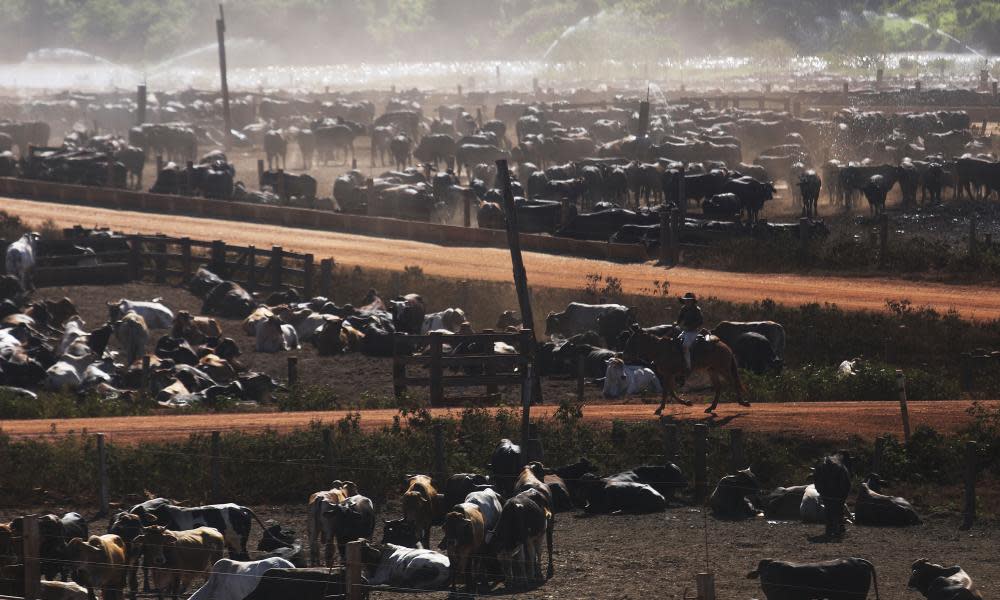World Bank urged to rethink investment in one of Brazil's big beef companies

The World Bank should reconsider its investment in one of Brazil’s biggest beef producers because of the industry’s links to deforestation and the climate crisis, according to two UN-appointed experts.
Minerva is Brazil’s second largest beef exporter, and some of its product is supplied, both directly and indirectly, by cattle farmers based in the Amazon rainforest.
However, although it has been able to certify 100% of its direct suppliers as zero-deforestation, it is currently – like the other large Brazilian beef companies - unable to monitor indirect suppliers.
The World Bank’s investment arm, the International Finance Corporation (IFC) holds a significant stake in Minerva.
“In light of the global climate crisis, the World Bank should ensure that all of its investments are climate-friendly and respect human rights and divest from businesses that fail to meet these criteria,” David Boyd, the UN special rapporteur on human rights and the environment, told the Bureau of Investigative Journalism.
His predecessor in the post, the international law professor John Knox, said the IFC and other finance houses should ensure they were not contributing to industries fuelling the climate crisis, “including by ending their support for massive industrial beef operations that depend on deforestation”.
He added: “International funding that contributes to the ongoing climate breakdown, either by supporting fossil fuel projects or by supporting deforestation, is completely inexcusable.”
The IFC told the Bureau it acknowledged the crisis in the world’s largest rainforest. “The integrity of the Amazon continues to be threatened by deforestation and degradation, with serious implications for the regional and global climate,” it said.
“IFC invested in Minerva to promote sustainable growth, including helping the company improve its environmental and social performance with the goal of creating a more sustainable beef industry … Minerva has taken a number of steps, with IFC’s help, to improve the traceability in its supply chain with its direct suppliers, and today 100% of its direct purchases come from zero-deforestation areas.”
However, the organisation admitted that no Brazilian beef company can be sure there is no deforestation in its supply chain, because there is no mechanism for monitoring indirect suppliers — the farms that breed or rear the cattle before the final ranch that sends them to the slaughterhouse. The Brazilian government does not publish the animal transit data in a format that would facilitate this monitoring.
“As of today, none of the players in the industry are able to reliably trace indirect suppliers at scale, and this includes Minerva,” said the IFC. “We believe that further progress against deforestation in Brazil depends on expanded government regulation, market demand for higher standards and, importantly, law enforcement at federal and state levels.”
Marfrig, another of the large cattle companies, recently told the Bureau of Investigative Journalism that more than half of the cattle it slaughters originate from these indirect suppliers. And research from the University of Wisconsin suggests that may also be be true for other members of the beef industry in the Brazilian Amazon.
In recent years there has been growing global awareness of the role of the beef industry in deforestation, as ranchers supplying vast meat businesses – either directly or indirectly – clear land to graze animals. One estimate, by the Yale School of Forestry and Environmental Studies, suggested the cattle sector is responsible for 80% of deforestation in every country covered by the Amazon.
Minerva’s head of sustainability, Taciano Custódio, told the Bureau: “[The] IFC’s investment has helped Minerva with the enhancement of key performance indicators on environmental and social governance.”
He echoed the IFC’s claim that all of Minerva’s direct purchases come from zero-deforestation areas in the Amazon biome.
Custódio said more regulation was needed to address the inability to track suppliers further up the supply chain. “Monitoring indirect suppliers is, as correctly pointed out, not done today and very challenging. As of today, none of the players in the industry are able to trace indirect suppliers and for that to be done, law enforcement is required for all actors in the value chain.”
However, he also made a case for deforestation, saying: “South American countries still have a great percentage of forest and uncleared lands that can be legally and sustainably explored. Some countries rely on the necessity to expand their production territory in order to develop and invest in public health, public education and infrastructure.”
Related: The climate crisis is the most urgent threat of our time. Help us fight it | Katharine Viner
Research published this year suggests the beef industry is responsible for 5,800 sq km of deforestation every year in Brazil. The research by the sustainability project Trase mapped supply chains for Brazilian beef back through customs and slaughterhouses to the municipalities where cattle were raised, using customs, agricultural, and sanitary inspection data.

Having traced the cattle back to their original municipalities, Trase cross-referenced government figures on cattle numbers with deforestation data and official data on new pastures to calculate a deforestation “risk” – presented as an area in square km – associated with companies and specific international markets.
The risk calculation, which for the first time took indirect suppliers into account, linked the export supply chains of Minerva to more than 100 sq km of deforestation every year.
Custódio disputed the Trase research and told the Bureau that land speculation was the main cause of deforestation in the Amazon. He said banks should be blamed for offering credit to those who were clearing the forests. “While open and cleared lands continue to be treated as best for financial subsidies, people will continue to convert native vegetation into productive lands to access more credit,” he said.

 Yahoo News
Yahoo News 
